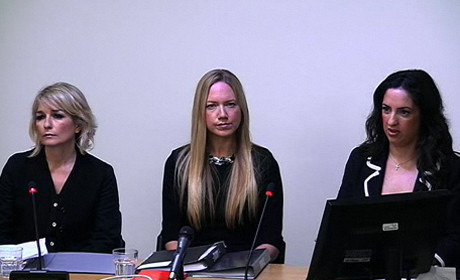
The editors of Heat, Hello and OK appear before the Leveson inquiry
The editors of Hello and Heat magazine today suggested that a "mechanism" which could offer an updated record of celebrity privacy requests, particularly in relation to the photography of children, could help offer added clarification on what should or should not be published.
At the Leveson inquiry today, where three magazine editors appeared as a group, Lord Justice Leveson asked whether it would be of use to them if there was a "register" where "people likely to be of interest" to the press could signify "what's permissible".
Editor of Hello magazine Rosie Nixon told the inquiry she did not think many would ask for a total ban on photos of their children, adding that in some cases "it is not alright to show a photo of them just going about daily life on the street with their child" but that the same celebrity may take their child to a film première.
"So there are individual circumstances for a lot of people," she added.
Earlier in her evidence she also told the inquiry it would be "really useful" if celebrity representatives "universally" used a body such as the PCC in general terms, so magazines could check for guidance.
But she also said Hello has "intense" checking mechanisms of its own which would mean they would still go direct to the person's representative anyway.
Leveson asked if, given the "individual circumstances" highlighted by Nixon, editors would be "assisted by some mechanism that clarified all that", to which she responded: "Yes I think we would."
Editor of OK magazine Lisa Byrne raised some concerns that "every celebrity might say I don't want any of my family ever pictured again" which could "cause problems".
"The way it works at the moment for OK is fantastic ... I'd be a bit worried if we had a system where there was a list, it might become more complicated whereas at the moment I'm fine with just contacting people ... Newspapers might feel totally different."
Editor of Heat magazine Lucie Cave added that she agreed with Nixon that it "depends on the circumstances of the celebrity at that time".
"It might that there's a moment in their life where they particularly don't want a photo taken of them ... then at other times they might be happy to have a photograph taken. It would be a very useful tool for us if they used a body like the PCC to update them on their circumstances, because it might not be they want to be on a list forever."
Leveson interjected to say he was "not suggesting it's set in stone" but that he is "conscious there have been number of quite important pieces of litigation concerned with the publication of photographs and the like".
During their evidence to the inquiry the editors also discussed their relationships with the celebrity subjects of their respective magazines.
Byrne said OK magazine is "mainly working with agents and celebrities directly" and get stories "straight from the horses mouth".
Nixon added that at Hello magazine there is a "long negotiation process" before a story is published, and that the magazine has an "honest, trusting, co-operatice relationship" with celebrities.
"We ultimately wouldn't do anything to upset anybody. We're a positive magazine. We're a glass half-full magazine."
Cave added that Heat also has "great access" to celebrities.
The trio were also asked about copy approval, which Cave said Heat magazine does "try not to" give as a general rule.
But she said it is something PR staff seem to be "pushing for more and more".
Nixon added that "as a general rule", Hello magazine also does not offer copy approval, but "if pushed sometimes we do".
Byrne said that OK magazine "would never offer it immediately, but if they required it we definitely would".
Looking forward at issues of regulation Nixon said the "important thing is we're not over-regulated" and that not all media outlets are "tarred with the same brush".
She also called for greater magazine representation on any future version of the PCC.
"I welcome hearing how things will change in future, but not over-regulating is something key".
Byrne added that at OK magazine "readers are happy, celebrities are happy" and therefore "if someone would come down with some ridiculous edict to follow I'd be really unhappy about that".
"We haven't done anything wrong. This inquiry came about because people were doing illegal things, we havent been doing that, so if it is detrimental would be really terrible for us."
Free daily newsletter
If you like our news and feature articles, you can sign up to receive our free daily (Mon-Fri) email newsletter (mobile friendly).
Related articles
- Newsrewired throwback: What you learned at our previous digital journalism conference
- First-party cookies: 'Get legal help to avoid fines'
- Collecting first party data: Why meaningful consent should matter to publishers
- Tip: How to keep your communications secure
- Kevin Donnellan, social media consultant, on the dos and don'ts of social media reporting









